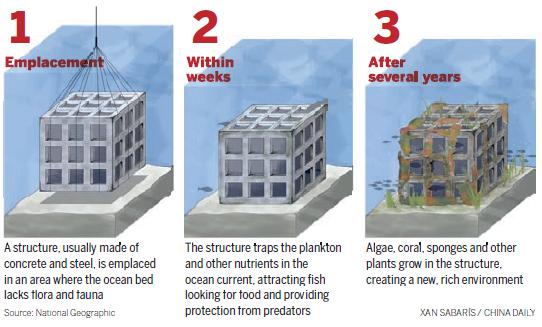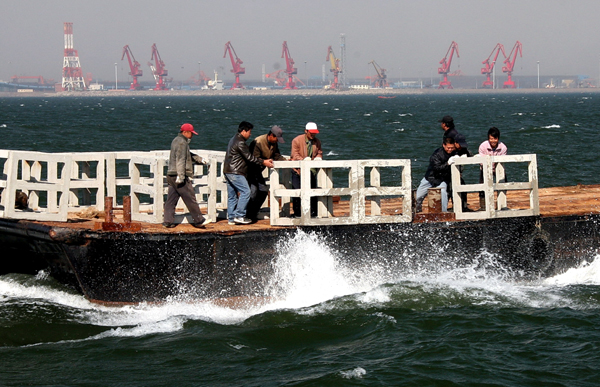Angling for solutions to a coastal crisis
Updated: 2015-05-05 08:20
By Peng Yining(China Daily)
|
|||||||||||
The construction of artificial reefs along China's vast coastline is helping to restore the maritime ecosystem, replenish fish stocks and improve the lives of local 'sea farmers'. Peng Yining reports.
Sun Xianli used to make a good living from the sea, but since 2011 his income has fallen dramatically as a result of pollution and overexploitation of fish stocks. In 2012, Sun's crop of mussels at his "sea ranch" failed, and he lost his main source of revenue.
"Too many people were farming the sea, and the water was filthy because construction sites on the coast were discharging industrial sewage into the water day and night," said the 50-year-old from the coastal city of Rizhao in Shandong province.
In 2013, a desperate Sun used a local government subsidy to sink concrete blocks in the shallow coastal waters to create a sustainable habitat for marine creatures that would attract large numbers of fish.
"The government launched a project to build an artificial reef in 2013. They told me the blocks would become a new home for the fish and restore the damaged environment," he said. "Now, the reef is my only hope."
Artificial reefs, which are used extensively in the United States and Japan, were first introduced in China in the 1980s, but have only been built in large numbers in recent years. The continuing deterioration of the underwater environment in coastal areas has resulted in the structures increasingly being used to promote marine life and fishing, and the scale in China is rapidly approaching those of Japan and the US, according to the State Oceanic Administration.
"Fish gather around reefs. That's common knowledge among fishermen," Sun said. "In 2008, we caught fish worth 300,000 yuan ($48,000) in the waters near a 10-meter-long shipwreck, so I believe our artificial reef will attract a lot of fish."
The Rizhao government has built six large artificial reefs, using concrete blocks, tubes and rocks. The largest covers 98 hectares and includes more than 100,000 concrete blocks, each of 1 cubic meter. By providing hard surfaces to which algae and invertebrates such as barnacles and coral can attach themselves, artificial reefs attract large numbers of marine creatures and provide homes and food for fish.
"Artificial reefs attract fish, which breed in the waters around them and boost the population. That allows us to reduce the scale of sea farming and the pollution it causes. It also means we can reduce the scale of long-range fishing to protect marine life in the deep oceans," said Zhu Jingyou, deputy director of the Rizhao Oceanic and Fishing Administration. "The development of artificial reefs will be an important part of our job in the coming years."
Although artificial reefs were first used in Japan to boost fish stocks and marine agriculture after World War II, a similar practice had been employed on a very small scale in certain parts of China for centuries.
During the Ming dynasty (1368-1644), fishermen in the coastal areas of southern China embedded bamboo poles in the sea bed and filled the spaces between them with rocks and tree branches to create environments that would attract fish.

Related Stories
China completes first coastal space launch center 2014-10-21 07:59
Today's Top News
Xi meets visiting KMT chairman
Siemens healthcare unit probed by China regulator for bribery
UK urged to ease up on visa curbs
Chinese president to visit Russia, Kazakstan, Belarus,attend WWII celebration in Moscow
Two dead in Greek prison inmates' clashes
Protest against police violence expands to NYC
Official: Election outcome won't change Britain's policy on China
Milan tightens security ahead of Expo opening
Hot Topics
Lunar probe , China growth forecasts, Emission rules get tougher, China seen through 'colored lens', International board,
Editor's Picks

|

|

|

|

|

|







